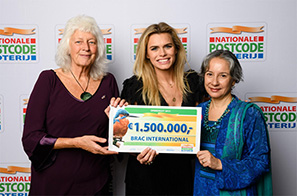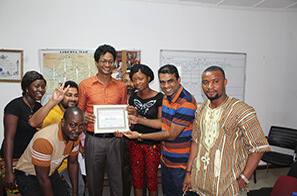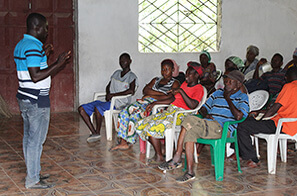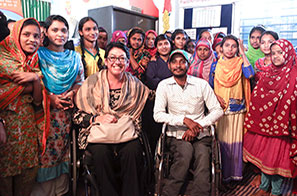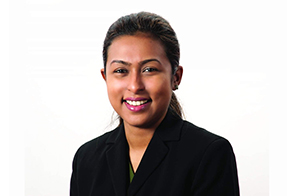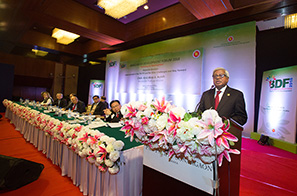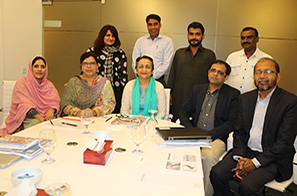
English (959)
Children categories
Dutch Postcode Lottery supports BRAC in fighting extreme poverty in Liberia
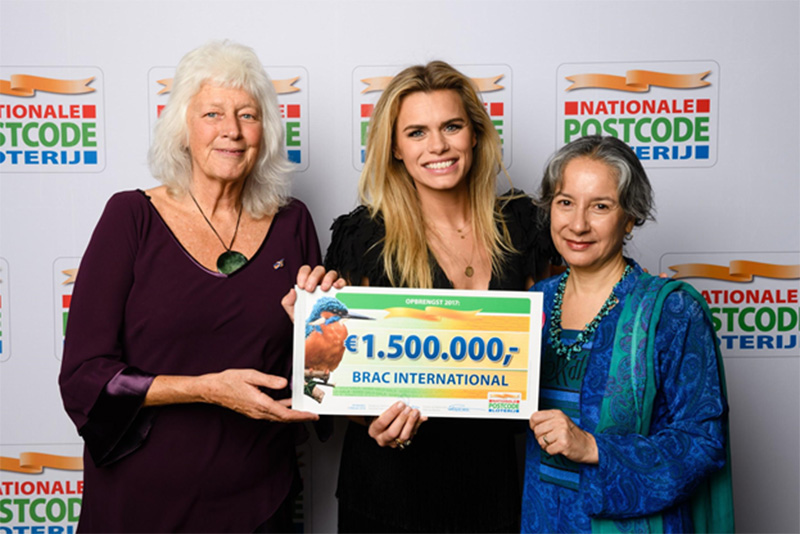 Sylvia Borren, vice-chair (left) of BRAC International, Nicolette van Dam (middle) ambassador of the Postcode Lottery and Fawzia Rasheed (right) board member of BRAC International. Credits: Roy Beusker Fotografie.
Sylvia Borren, vice-chair (left) of BRAC International, Nicolette van Dam (middle) ambassador of the Postcode Lottery and Fawzia Rasheed (right) board member of BRAC International. Credits: Roy Beusker Fotografie.
Friday, February 16 - BRAC, for the first time ever, received a contribution of 1.5 million euros from the Dutch National Postcode Lottery to combat extreme poverty in Liberia. BRAC will employ their proven approach to permanently lift women and families (those who live on less than 1.69 euros a day) out of extreme poverty.
BRAC has helped 1.7 million families in Bangladesh out of extreme poverty through its graduation approach. It provides a step-by-step guide to women, who in two years time, “graduate” permanently from extreme poverty along with their families. "With this fantastic contribution from the Postcode Lottery, we can do in Liberia what we already achieved on a large scale in Bangladesh," said Sir Fazle Hasan Abed, the founder and chairperson of BRAC.
Natural allies
According to Sir Fazle, the Postcode Lottery and BRAC are natural allies. The Postcode Lottery involves millions of people in strengthening charities, while BRAC helps millions of people to fight poverty through piloting, perfecting and scaling projects. BRAC is currently operating in 11 countries in Asia and Africa with a holistic and integrated approach to fighting poverty consisting of education, agriculture, microcredits, health and strengthening of girls' and women’s rights.
BRAC’s graduation approach is highly recognised by prominent international researchers from Yale, Massachusetts Institute of Technology and the London School of Economics, amongst others. Studies have repeatedly proven the effectiveness of the model, and the results are permanent. The graduation approach has been adopted by governments and NGOs in 37 countries. BRAC is targeting to lift a further one million people out of extreme poverty through this approach.
"BRAC realised that, despite 40 years of programmes and strategies, it still could not reach the poorest group. The people who are invisible and can not participate in their community because they are too poor. We listen, involve from day one, people from the community. We start small- test, adjust, test again- and scale to large numbers of families, in more villages and slums, and regions and eventually to a whole country.”
-Sylvia Borren, vice-chair, BRAC International.
BRAC Liberia awarded Outstanding International NGO of the Year for 2017
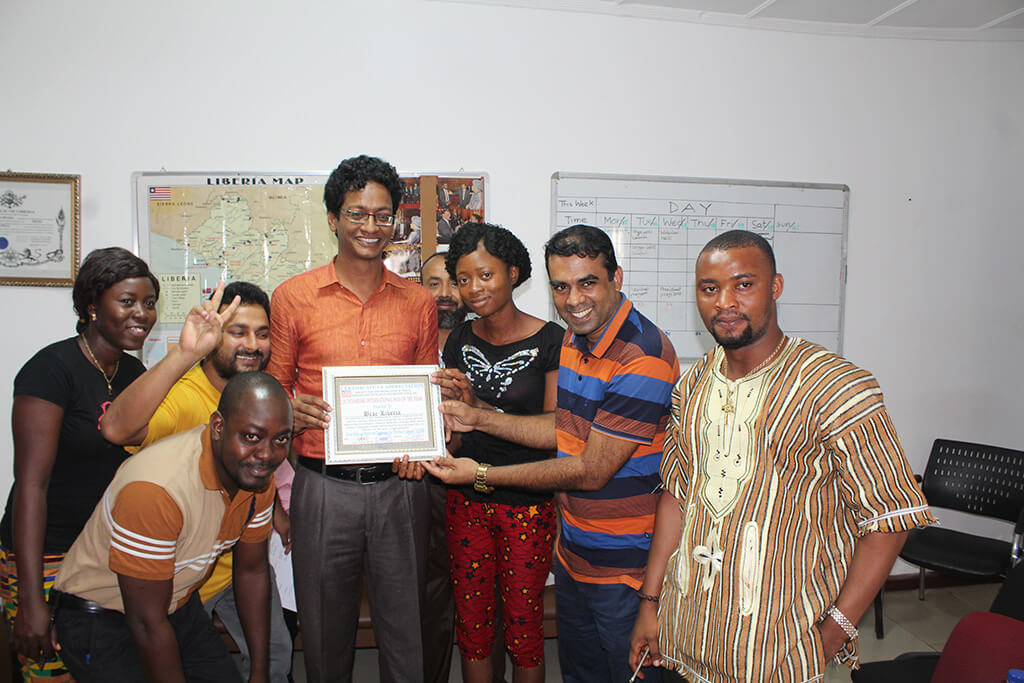
BRAC Liberia was awarded ‘Outstanding International NGO of the Year’ for 2017 by the Society for the Promotion of Peace, National Reconciliation and Reunification (SPPNRR) on Thursday, 9 February 2018.
J Mayfield Copson, national chairman and chief executive office of SPPNRR, spoke of the award, “We honour you, BRAC Liberia, as a good, reliable and productive capacity-building international NGO of the Year 2017, for your invaluable and measurable contributions towards society’s good, for which you are present across 10 of our 15 political subdivisions.”
Md Abdus Samad, BRAC Liberia’s senior programme manager for education, and the empowerment and livelihood for adolescents, thanked SPPNRR for bestowing the award, promising to work even harder to deserve such an award again. He spoke of BRAC’s pride in working towards alleviating poverty, and ending exploitation and discrimination of all forms in Liberia. He added that BRAC’s promotion of diversification and capacity development has resulted in the placement of more Liberians in senior management positions within the organisation.
According to World Bank, 54% of Liberia’s population lives below the poverty line. Since 2008, BRAC Liberia has taken holistic, integrated approaches to combating poverty, including programmes in microfinance, health, empowerment and livelihood for adolescents, education, and food security and livelihoods.
Promoting nutrition awareness to fight malnutrition
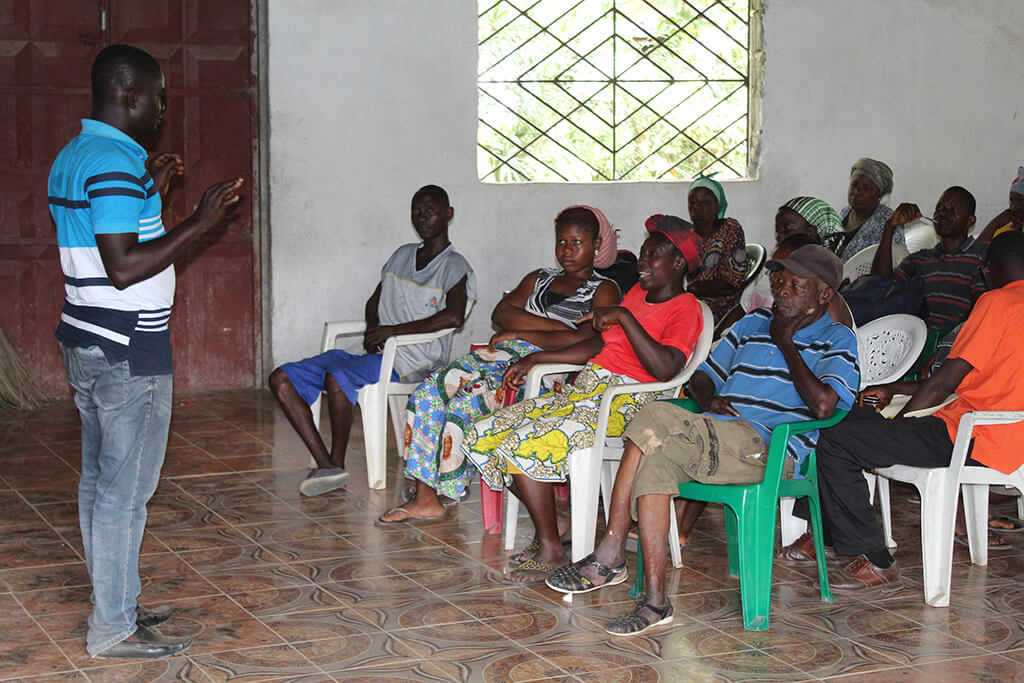
BRAC, in collaboration with the Government of Liberia and the European Union under its Pro ACT 2015 food security project are implementing a series of nutrition awareness activities to reduce the prevalence of malnutrition in the country.
Liberia stands at 177 out of 188 countries in the UNDP Human Development Index (2016). 32% of children under five years are stunted and 15% are underweight (USAID).
BRAC is conducting nutrition awareness campaigns (NAC) and mother forum sessions as a way of reducing the prevalence of malnutrition in all its forms, including micronutrient deficiencies. In 2017, 910 mothers, pregnant women, and other women of child-bearing ages were enrolled into mothers forums totalling 91 NAC groups comprising 10 members each, and seven per branch. Members are taught the importance of food diversification (eating from the five food groups), feeding practices of pregnant women and children, women nutrition, care of sick and malnourished children, prevention of vitamin A deficiency, as well as consumption of iodine salt and comprehensive homestead development.
Ms Thon Okanlawon, a nutrition officer, has noticed that food diversification and exclusive breastfeeding are already being practiced by project participants. “The participants take into their localities knowledge gained under the programme as a way of promoting active lifestyle changes,” she remarks. “Some of what they are being taught was not practised in the past, but they are now well prepared to change eating habits and breastfeeding practices which reduces malnutrition and micronutrients deficiencies, as well as stunting.”
The project currently operates in 13 branches in six of the 15 counties of Liberia, (Montserrado, Margibi, Bong, Grand Bassa, Bomi and Grand Cape Mount) with similar expansion planned for the next phase running from September 2017 to September 2018.
Burning issue: Dhaka slums fight fires but land problems loom
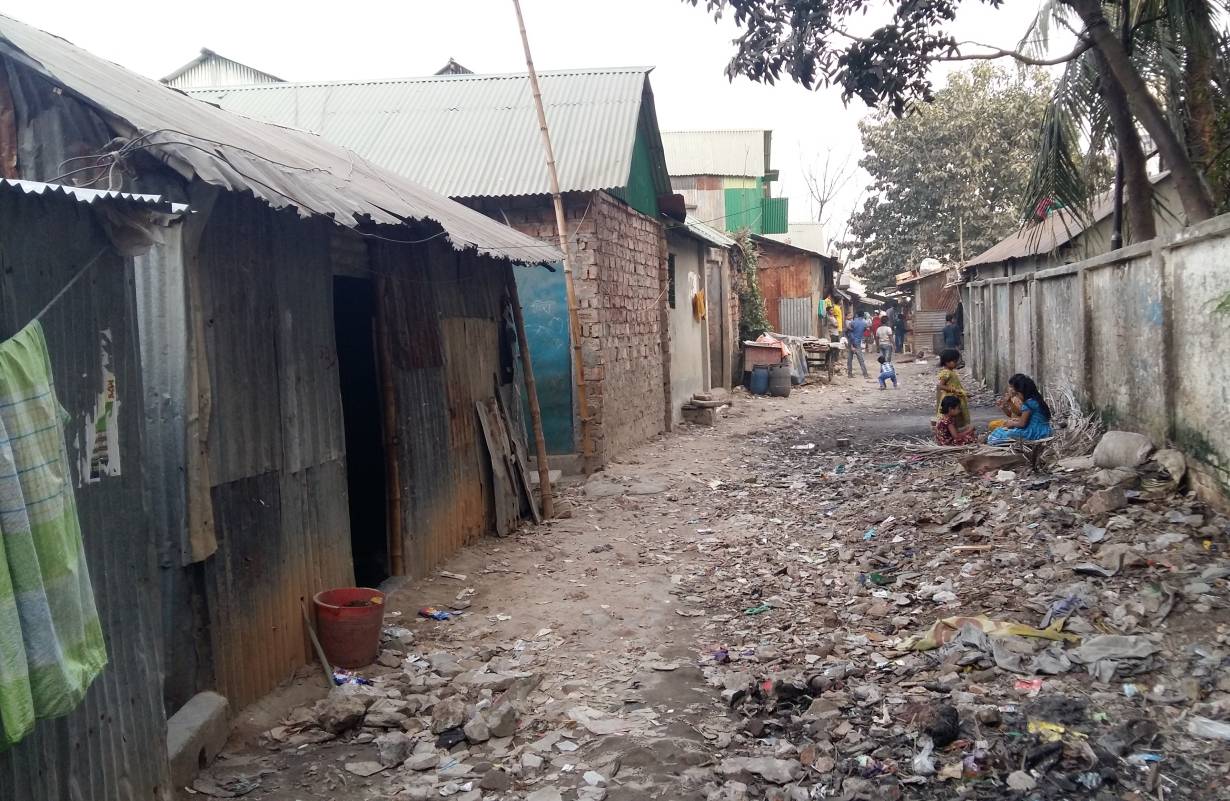
DHAKA, Feb 1 (Thomson Reuters Foundation) - Bilkis Begum has lived on the lakeside in Dhaka's Korail slum for 16 years, but in December 2016, her extended family's 12 houses were razed to the ground by a fire.
The inferno destroyed the oven her husband, Shahid Gazi, used for his bakery and the fridges he relied on for his business selling leftover chicken meat from Chinese restaurants.
For the Gazis, it was a struggle to cobble together the $3,000 they needed to rebuild their homes and business.
They borrowed $900 from moneylenders, and found the rest from relatives and friends. They also got tin, pillars and a little cash aid from Bangladesh-based development agency BRAC.
In addition, they received pro-bono help from architects like Sheikh Rubaiya Sultana, who helped redesign the neighbourhood to protect it better against future fires.
"Architects have social responsibility," said Sultana, an assistant professor at BRAC University in Dhaka. "I watched the fire before my very eyes, but couldn't do anything then."
The Gazi family now has eight new units and the couple are back in business, running a small restaurant on the old site.
"We couldn't have stood back on our own feet unless we got (this) support," said Begum, 32, a mother of three.
A team of 16 architects, planners, engineers and students, brought together by BRAC, has tested out simple, cheap design solutions to rebuild Dhaka's two biggest slums after fires destroyed some 650 homes in late 2016, affecting 2,500 people.
The new approach aims to tackle the ever-present threat of fires in Dhaka's crowded slums, while improving living conditions for residents.
But in a city where less than 10 percent of areas are planned, altering the slumscape is a tall order.
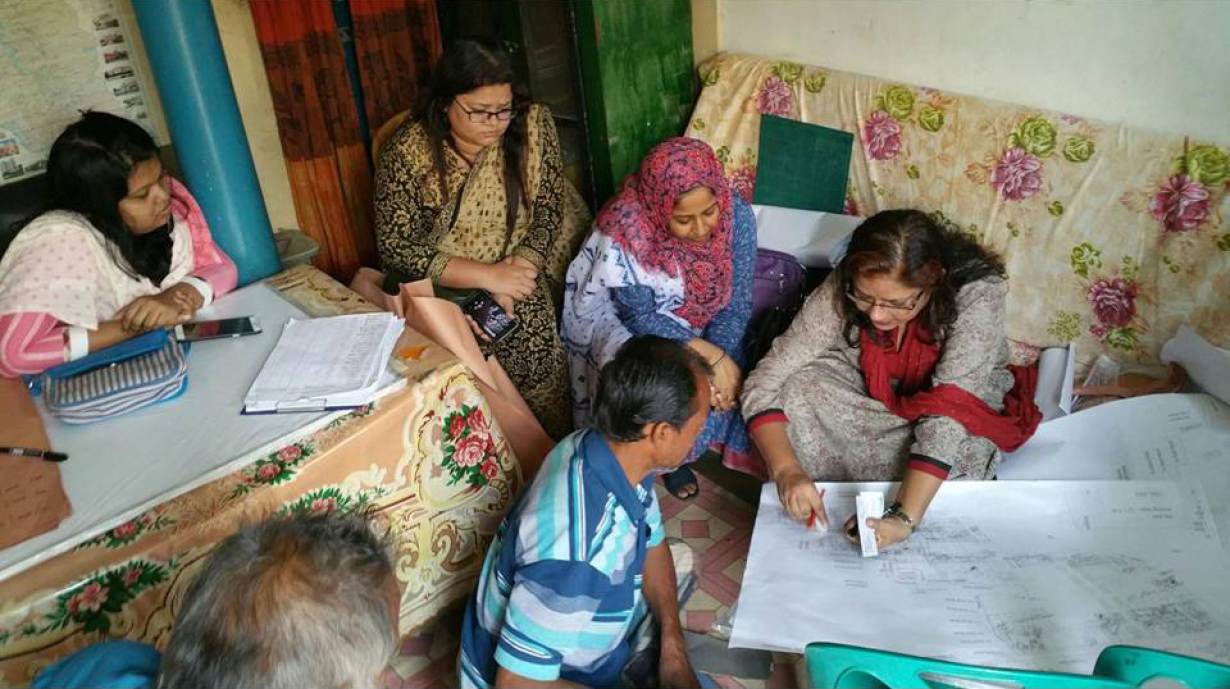 A team of volunteer architects led by Aforza Ahmed of J.A. Architects works with a home owner in Korail slum, locating his home on a map drawn up by them in Dhaka, Bangladesh. HANDOUT/J.A. Architects Ltd
A team of volunteer architects led by Aforza Ahmed of J.A. Architects works with a home owner in Korail slum, locating his home on a map drawn up by them in Dhaka, Bangladesh. HANDOUT/J.A. Architects Ltd
LACK OF LAND RIGHTS
One major challenge is working out what is feasible for slum residents who have no legal rights to the land they live on.
Ashekur Rahman, an urban programme specialist with the United Nations Development Programme (UNDP) in Bangladesh, said the transitory existence of many slum dwellers is a major impediment to keeping them safe from threats like fires in the longer term.
Many are seasonal migrants who split their time between villages and cities, limiting their access to services and permanent accommodation.
Government providers worry that improving services in informal settlements could attract more migrants from rural areas, Rahman said.
"Weak and ill-defined land tenure and property rights pose big threats to resilience-building and are considered the underlying causes of the poverty and vulnerability of the urban poor in Bangladesh," he added.
WIDER ROADS
Sandwiched between Dhaka's upscale Gulshan and Banani neighbourhoods, Korail - which sprang up in the 1980s - sprawls over some 170 acres of land owned by three government ministries.
It is home to as many as 100,000 residents, including rickshaw drivers, domestic helpers, garment workers and small traders.
Fire is just one of the threats inhabitants face on a daily basis, which include eviction, drugs, crime, police harassment and extortion.
After digitally mapping the fire-hit areas, the design team led by Dhaka-based J.A. Architects Ltd consulted with residents who each agreed to give up a tiny amount of space to widen access roads and narrow lanes so that fire trucks and ambulances could enter if another blaze breaks out.
The group of experts was appalled by the unhygienic conditions in the slums. In summer, the tin shacks are "like ovens", said Shamim Hossain, a manager with BRAC's urban development programme.
To improve living conditions, the team made modifications to dwellings, such as adding windows, wire netting and transparent plastic to let in air and light.
They also helped rebuild homes in Sattola slum, which suffered a major fire in December 2016 too, destroying 115 homes in just 10 minutes.
Made homeless overnight, residents had to pass more than three cold winter months under the open sky.
MORE AIR, LIGHT
In the slum, which is home to 50,000 people and located on land belonging to the health ministry, residents have since built concrete houses with green tin roofs to reduce losses in the event of a fire - despite the risk of eviction as the government plans to build a physiotherapy college there.
The new design has allowed some homeowners to afford a luxury - a communal area – as well as an upstairs.
In the family space, where children play and adults gossip while sipping tea, Rabeya Akhter recalls how she clambered out of the house when her brother-in-law shouted "Fire! Fire!" just after midnight on December 12, 2016.
Her family lost valuables worth about $600 when their TV, PC monitor, wardrobe and other furniture burned to ashes.
They managed to get credit of more than $3,600 to rebuild their home, mostly from Dhaka-based micro-finance institution DSK.
Shah Alam, who co-owns a two-storey home, has used metal netting for corridor walls and plastic roofing in parts to ensure it is ventilated and well-lit – an idea partly his own and partly from the volunteer architects.
RURAL MIGRANTS
Like Akhter's father-in-law Siddiq Howladar, 70, who moved to Dhaka from the southern island-district of Bhola, many of Sattola's residents migrated from coastal Bangladesh, where land erosion and floods are common, poverty is pervasive and jobs are rare.
Dhaka alone attracts an estimated half a million rural migrants seeking employment each year, according to the World Bank. Almost one-third of its population of 18 million lives in slums.
Government figures show some 20,000 fires occur annually in Dhaka. But the cause often remains unknown, and the blazes get little international attention.
Residents of the capital's Kalyanpur slum suspected a fire that gutted dozens of homes in early 2016 was started deliberately to remove them from land owned by the ministry of housing and public works, local media reported.
It happened a day after a court order to halt an eviction that had sparked violence between inhabitants and police.
Abu Obaidur Rahman, a lawyer with the Bangladesh Legal Aid and Services Trust, told the Thomson Reuters Foundation the fire had "accelerated the eviction process", although the Dhaka-based charity had no evidence of who started it.
"Slum dwellers are citizens of this country and they make a contribution to the city," he said. "The government has the responsibility to rehabilitate them."
"TEMPORARY" RESIDENTS?
While the transformation of parts of Korail and Sattola has made residents less vulnerable to fires, the thorny question of land tenure persists.
City councillor Mofizur Rahman described Korail's residents as "temporary" and said they would have to vacate the land when the government starts to build an IT park there.
Under a new programme to reduce urban poverty, the UNDP aims to resettle people on unused or under-used government land, and broker medium-term tenure deals between private land owners and tenants, said the agency's Rahman.
Hossain Zillur Rahman, executive chairman of the Power and Participation Research Centre, a Dhaka-based think-tank, believes urban policy must become "humane" so that slum dwellers can get more secure land tenure.
Supporting reconstruction in the fire-hit slums was the "right decision" but it did not advance residents' legal rights, he noted.
For now, Korail and Sattola are "more liveable than before", said BRAC's Hossain.
"It's a start," said architect Sultana. "Others can follow it."
Former Australian Paralympics World Champion visits BRAC ADP girls
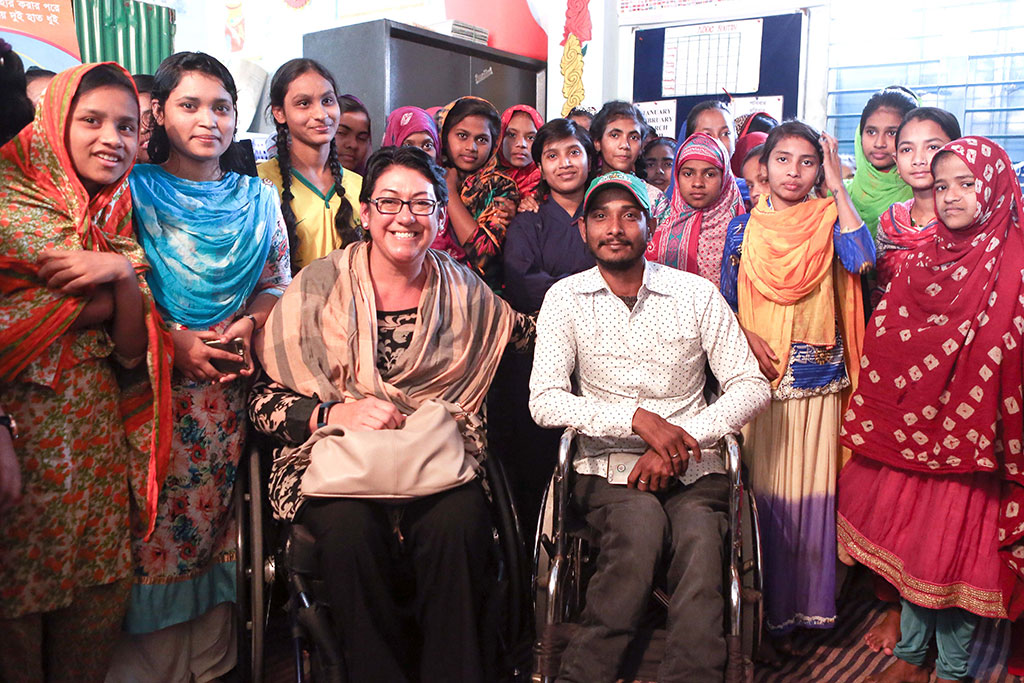 Priya Cooper and Mohammad Mohasin with BRAC ADP girls. (Photo credit: BRAC)
Priya Cooper and Mohammad Mohasin with BRAC ADP girls. (Photo credit: BRAC)
Inspires female athletes to backstroke over challenges
Ms. Priya Naree Cooper, a nine time gold medalist disabled swimmer and recipient of the Order of Australia Medal, visited the capital’s Karail slum area yesterday (January 29) to engage with the youths of BRAC’s Adolescent Development Programme. Ms. Cooper arrived in Bangladesh to attend this year’s Australia Day event and planned a visit to Karail in order to learn more about BRAC’s work through its Adolescent Clubs (Kishori Kendro) and Neuro-Developmental Disability Centres.
Having achieved success despite suffering from cerebral palsy, Ms. Cooper has been highly vocal about getting more people with disabilities involved in sports. She was appointed Deputy Chair of the Disability Services Commission for Western Australia in 2017. The visit was jointly organised by BRAC and Australia’s Department of Foreign Trade and Affairs (DFAT) in Bangladesh. Mohammad Mohasin, Founder of Wheelchair Cricket Welfare Association Bangladesh, Prafulla Chandra Barman, Programme Head of BRAC Education Programme, and Angela Naumann, First Secretary of DFAT Bangladesh, were present during Ms. Cooper’s visit.
“Witnessing these girls, who have been denied many privileges in life, embrace sports to make their dreams come true was very impressive. It fills me with joy to see that just like me, these young people are driven to achieve something big despite facing significant barriers. With proper guidance and support, they will be able to take charge of not only their future but also the future of Bangladesh,” Priya Cooper stated.
The Strategic Partnership Agreement was formed in 2010 between BRAC, the UK Government and the Australian Government based on the principles of supporting development goals for Bangladesh by being mutually accountable.
Aarong, BRAC’s Social Enterprises, and Life: An Interview With Tamara Hasan Abed, Senior Director, BRAC
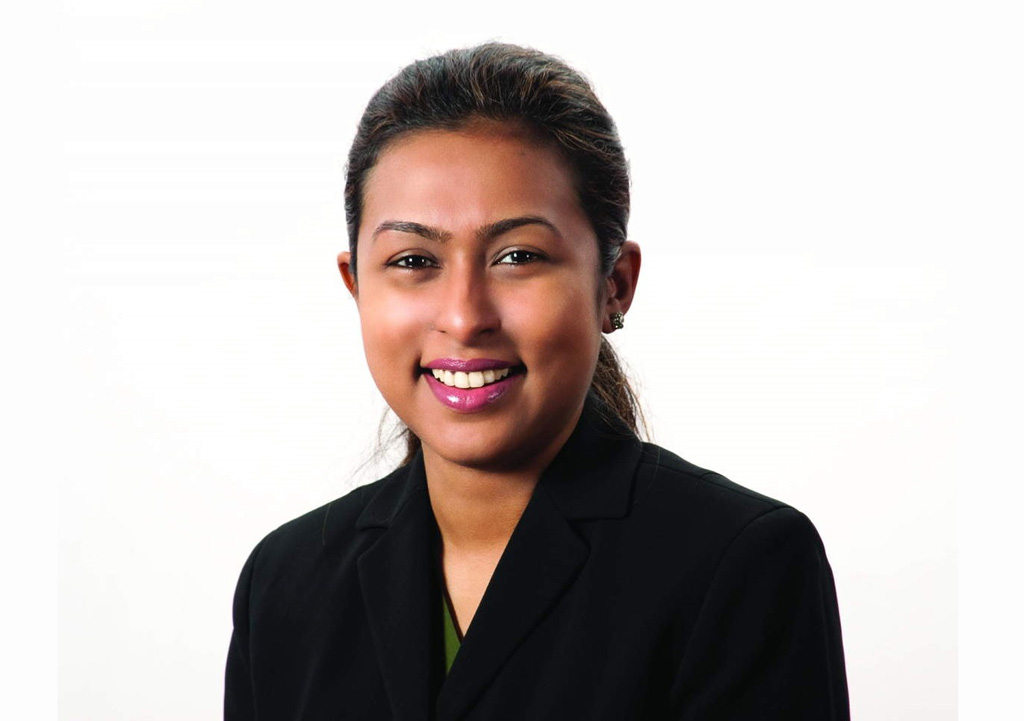
This article was originally posted in futurestartup.com on 17 January 2018.
“When I was 7 years old, my mother died while giving birth to my younger brother. Although I was too young to comprehend the magnitude of my loss, it changed my life forever in many ways,” says Tamara Hasan Abed. She continues, “I became very protective of my little brother and tried to take care of him in whatever small way possible for me at that age. From someone who used to receive care, I saw myself as a caregiver instead. As a result, I grew up a lot faster than many other children of my age. I became more responsible and self-reliant out of necessity.”
Tamara Hasan Abed is a Senior Director at BRAC where she heads all of BRAC’s 13 social enterprises including Aarong and sits on the board of Brac University and other Brac ventures and investments. A 70s child, Ms. Tamara has a fascinating story. She completed her schooling in Dhaka, studied and lived in India as a young-adult and then went to the London School of Economics and Political Science to study Economics. She worked in investment banking, pursued entrepreneurship that led to building her own business, studied, lived and worked in New York and witnessed “the growing intolerance everywhere” against Muslims after 9/11 – an event that eventually changed the trajectory of her life. It “made me feel the fragility of human life” and “I felt an intense urge to return home”. Then she returned to Bangladesh, started working at Aarong as a part-time gig, “my father asked me to help stabilize the organization and take care of some urgent needs. Initially, I volunteered part-time and did not take it as a possible career choice for me” but when she started working and came to see that Aarong works at the intersection of design, business, and social good, she “quickly fell in love with the work” and found her calling in it.
In this interview, we explore a wide range of topics ranging from Ms. Tamara’s early life and her journey to becoming who she is today, inner workings of Aarong as a social enterprise, the state and future of retail in Bangladesh and Aarong’s ambition going forward, what makes Aarong a social enterprise and different from other for-profit entities and what does it take to build a successful social enterprise, BRAC’s social enterprise efforts and her thought on management, teamwork, leadership and finally, why mindful presence is far more rewarding an experience and an effective antidote to our ever-growing anxieties of modern life and why we should actively resist the idea of planning too much about life and instead live life as it comes while trying to keep our center solid.
This is sublime, intellectually inspiring and an altogether brilliant read, I hope you enjoy – Ruhul
Future Startup
Thank you for agreeing to do this interview and being generous with your time. Where did you grow up? Please tell us about your journey to what you are doing today.
Tamara Hasan Abed
I had a wonderful childhood in 1970s Dhaka. We lived in a house with a big garden and lots of fruit trees in the floor below my maternal grandparents. My early years were filled with people, fun, and laughter and provided me with some of the happiest memories of my life. It was a lively household where relatives and friends always dropped by and stayed.
My father had already started BRAC and my mother worked with him, a partnership which seemed effortlessly complementary and woven together in purpose, values, intellect and much more. It was early days at BRAC, with projects in Sulla (Sylhet) and subsequently Jamalpur and Manikganj and I would spend a few days every month living in these rural areas with my parents.
When I was 7 years old, my mother died while giving birth to my younger brother. Although I was too young to comprehend the magnitude of my loss, it changed my life forever in many ways. I became very protective of my little brother and tried to take care of him in whatever small way possible for me at that age. From someone who used to receive care, I saw myself as a caregiver instead. As a result, I grew up a lot faster than many other children of my age. I became more responsible and self-reliant out of necessity.
I did my schooling in Dhaka and after completing my O’levels, I went to Kodaikanal International School (Kodai) – a beautiful boarding school located on a hill station in South India- for my International Baccalaureate.
Kodai helped me to become independent and learn to navigate a bigger world than what I was familiar with, and exposed me to people from different cultures, backgrounds, and religions. It was enriching, to say the least, and I made some of my lifelong friends there.
After Kodai, I went to the London School of Economics and Political Science to study Economics, and returned to Bangladesh, after finishing my studies, to join Peregrine Capital, a Hong Kong-based investment bank, in corporate finance. It was the first foreign investment bank opening its branch in Bangladesh. Working in Peregrine was an incredible learning curve for me. We were a small team. There was a minimal hierarchy in the office, and I got the opportunity to work on projects with some of the largest and most successful corporates in Bangladesh at a very young age.
The corporate world in the mid-90s in Bangladesh, and even to this day, is largely a male-dominated one. I would go to meetings with clients who were all men – men who only looked at each other when they spoke and hardly made eye contact with me. It took me a few months to realize that if I had to get these men to acknowledge me, I would have to know my stuff inside out and always speak up. So I did. At first, there would be a look of surprise that the youngest person sitting on the table, and that too a woman, would want to speak. But once I did, and if I sounded like I knew what I was talking about, from then on I always got more respect and earned my seat at the table.
After two years at Peregrine, working 12 to 14-hours a day, I decided it was time to move on. I felt the urge to try something entrepreneurial and started a cafe business which is the Grassroots Café you now see at Aarong outlets. Starting a business at the age of 23, dealing with every aspect from quality to customer service, marketing, procurement, finance, product development, training and managing people, and feeling that my staff and their families relied on me and the success of my business, taught me more than I could have ever hoped to learn from a job at that age.
When my cafes were set up, I decided to work part-time in BRAC’s Urban Development Programme. My area of focus at BRAC was to develop groups of women entrepreneurs in Dhaka’s slums, with loans, mentoring, technical assistance and whatever else they needed (help with getting a trade license, or a gas connection, for example). I could not only bring my experience of starting my own business, but knew in which areas I could have benefitted with some support when I started and tried to mentor the women in my groups accordingly. What they needed most was encouragement and courage and mentorship. It was an exciting project and a most rewarding experience for me.
Then in late 1999, I decided to do an MBA. It was almost four and a half years since my graduation. I sold my café business and moved to New York to start an MBA at Columbia Business School, Columbia University. What an exhilarating experience living in New York was! I loved the city and the school. I loved it because of its diversity, its ability to stimulate intellectually, aesthetically, creatively, gastronomically, musically and in every other way possible. I soaked it all in. Some of my best friends from Kodai had also moved there, and my time at Columbia too provided some deep friendships.
I finished my MBA and joined Goldman Sachs in Mergers and Strategic Advisory. But a few months into my job at Goldman, 9/11 happened. That morning in New York, like any other Tuesday morning, I took the subway to work, which was five minutes’ walk from the World Trade Centre. But what transpired when I got out of the train station will forever be etched in my mind.
9/11 changed everything overnight in New York, and I dare say in the rest of the world, although we did not know it then. Overnight, hatred against Muslims reached an intolerable level. I did not face it personally, but I could feel the growing intolerance everywhere, in conversations I overheard in bathrooms, at the coffee stand, in corridors in the office, in the media, everywhere. Then the war in Afghanistan started. All of this made me reevaluate my life, my purpose, and my priorities. 9/11 made me feel the fragility of human life. It made me question what I was doing working at an investment bank living so far away from my family and loved ones. I felt an intense urge to return home.
In December 2001, I left Goldman and returned to Dhaka. I wanted to take a couple of months off to figure out what I would do next. Aarong was going through massive management restructuring at that time. My father asked me to help stabilize the organization and take care of some urgent needs. Initially, I volunteered part-time and did not take it as a possible career choice for me, because I couldn’t see then how my investment banking skills could be aligned to a social enterprise working with crafts.
Once I started, I quickly fell in love with the work. It had all the elements of what I could ask for in a job – it had the thrill and challenge of running a business, especially in retail; it was a hugely rewarding experience working and innovating with designers and craftspeople to make beautiful products; and best of all, it had a social purpose at its core, which warmed my soul. Aarong became my passion and I felt as if I had found my calling in life.
I joined Aarong as a General Manager of Design and Product Development in 2002. My role in BRAC has grown over the years – I now head all of BRAC’s 13 social enterprises (including Aarong) and sit on the board of Brac University and other Brac ventures and investments.
When I was 7 years old, my mother died while giving birth to my younger brother. Although I was too young to comprehend the magnitude of my loss, it changed my life forever in many ways. I became very protective of my little brother and tried to take care of him in whatever small way possible for me at that age. From someone who used to receive care, I saw myself as a caregiver instead. As a result, I grew up a lot faster than many other children of my age. I became more responsible and self-reliant out of necessity.
Future Startup
You have several decades of experience in investment banking, entrepreneurship, and social enterprise, what are the biggest lessons from all those years?
Tamara Hasan Abed
Firstly, having clarity of the organization’s vision and purpose is incredibly important. And one should then have a clear understanding of its strategy to achieve this vision and communicate it effectively with its employees. Decisions get taken at various levels in the organization and when people at different levels know what the organization wants to achieve and how these decisions are better aligned with organizational goals.
The best leaders and managers always develop people who work with them. I consider this a core responsibility of any supervisor – to actively create opportunities for people whom they supervise to enhance their skills and competencies so that they are able to grow into bigger roles. This keeps people motivated, it creates a culture of learning and continuous improvement, it helps with retaining your best people, it helps you to stay ahead of your competitors, and it ultimately benefits everyone. When you have people in management roles who feel threatened to develop people under them, it’s best to plan their exit.
Also, I cannot overstate the importance of having the right person in the right job, a fact we take relatively lightly in our culture. In the early days of my career, I made mistakes which cost me and the organization dearly. Despite knowing that some people were not fit for their role or had reached their level of incompetence, I could not take hard decisions to let them go since they had been in the organization for many years. I compromised on my judgment and tried to manage things with them and through them. But it seldom works out. It is critical that you make the decision about people who do not deliver without wasting too much time.
The institution is more important than any individual. Letting people go is the hardest thing you do as a leader but if you are committed towards your vision you have to make decisions that are tough and difficult.
Lastly, leadership can be a challenging journey, and often lonely and stressful. It requires resilience. It is important to take care of oneself in order to perform at your best and be there for others. By this, I mean taking care of one’s own needs as a human being. Be it the need for exercise, good sleep, healthy food habits, nurturing close relationships, entertainment, quiet time, reading, learning or whatever else an individual needs in order to be of sound mind and body, it is important to prioritize these things in order to be an effective leader.
The best leaders and managers always develop people who work with them. I consider this a core responsibility of any supervisor – to actively create opportunities for people whom they supervise to enhance their skills and competencies so that they are able to grow into bigger roles. This keeps people motivated, it creates a culture of learning and continuous improvement, it helps with retaining your best people, it helps you to stay ahead of your competitors, and it ultimately benefits everyone. When you have people in management roles who feel threatened to develop people under them, it’s best to plan their exit.
Future Startup
Please give us an overview of Aarong.
Tamara Hasan Abed
Aarong is BRAC’s flagship social enterprise, and Bangladesh’s most popular lifestyle retail brand. The word Aarong means ‘village fair’ in Bangla. It consists of 19 outlets (18 physical and one online store) and sells handcrafted products made by more than 65,000 artisans located all over the country. The Aarong team consists of over 3800 women and men who work together to make possible what you see and experience.
Aarong was born out of the need to create livelihoods for rural women in the mid-1970s. In 1976, BRAC organized groups of women in Manikganj and Jamalpur, trained them in sericulture and making handmade products such as block printed and embroidered cushion covers, bed covers, etc and started to supply these products to shops in Dhaka.
BRAC quickly realized that these shops paid for these products not when they were delivered, but in fact, once they were sold. It took months for these women to get paid for the goods. This is when BRAC decided to open its own retail outlet and the first Aarong shop opened on Mirpur Road in Dhanmondi in 1978. From the very first day, Aarong maintained the policy of paying its artisans and producers when products were delivered and Aarong took on the risk and responsibility of financing and selling the inventory.
Over the past few decades, Aarong has grown manifold and become a household name among urban consumers in Bangladesh. While we started with a few product lines initially, we now offer a vast range of products and are adding more categories regularly. Aarong has not only played a pioneering role in developing, promoting and protecting the rich heritage of Bangladeshi crafts such as nakshi kantha and jamdani, but has also left an indelible mark on the fashion industry in Bangladesh and what we now call Bangladeshi fashion.
Aarong is BRAC’s flagship social enterprise, and Bangladesh’s most popular lifestyle retail brand. The word Aarong means ‘village fair’ in Bangla. It consists of 19 outlets (18 physical and one online store) and sells handcrafted products made by more than 65,000 artisans located all over the country. The Aarong team consists of over 3800 women and men who work together to make possible what you see and experience.
Future Startup
How does Aarong collaborate with the artisans?
Tamara Hasan Abed
Aarong works with artisans in two ways. The first is through Ayesha Abed Foundation (“AAF”), which is a hub and spoke model with a main production center linked to many small subcentres. The main center receives orders from Aarong and prepares and distributes the order and raw materials to the artisans in the subcentre who mainly do the embroidery work.
The main center not only supervises the subcentres but does all the preparatory and finishing work, that is, tailoring, dyeing and printing, washing, ironing and quality control. AAF has 13 main centers linked to more than 600 subcentres. In 2018, we plan to establish two more main centers which will have many more subcentres under them and provide employment to 1500 more artisans.
AAF’s artisans have access to BRAC’s holistic development interventions such as microfinance, maternal health care, hygiene awareness, subsidized latrines, human rights awareness and legal aid, day care facilities for their children, etc, apart from their daily wages.
We also work with independent master craftsmen and small and micro entrepreneurs from different parts of the country whom we call independent producers. They directly take orders from Aarong and produce goods in their own workshop or cottage industry and deliver it to us. They employ groups of artisans under them. We audit our independent producers on 39 metrics under what we call our Social Compliance Audit, to make sure that our producers look after the artisans who work under them. We have over 800 independent producers working with us.
Future Startup
You maintain a contractual relationship with the majority of your artisans. You compete with private labels and earn profits. As a social enterprise, how are you different from other for-profit entities?
Tamara Hasan Abed
Our mission and purpose is different from for-profit enterprises. Our raison d’etre is to provide livelihoods for women and artisans and create market linkages for them, thereby contributing to the alleviation of poverty and financial empowerment.
Also, as a social enterprise of BRAC, we do not have any shareholders and the surpluses we make goes to fund BRAC’s development interventions, such as schools and programmes for the extremely poor.
Although we maintain a contractual relationship with our artisans and producers, our artisans not only receive holistic development support from Brac as I mentioned earlier, they also receive annual eye and health checkup, health insurance, retirement benefits, etc. Our producers receive collateral-free loans from Aarong to conduct and expand their business.
Most importantly, we try to ensure that our artisans and producers receive orders from us regularly throughout the year. Since we are vertically integrated in terms of production and retail, we can forecast sales and plan our production a year in advance. For example, Eid is one of the biggest selling seasons in our country. Instead of putting pressure on our producers and artisans in one month, we manage the production of Eid throughout the year in order to ensure regular work for our artisans, although it is not necessarily financially optimal for Aarong to produce and hold Eid inventories throughout the year.
The key difference is that, unlike other for-profit enterprises, our decisions are not based on profit maximization. Let me give you another example. Most for-profit retailers would think about stocking the most profitable and fastest selling products on their shelves. They would try to maximize returns from each square foot of retail space. As a social enterprise, this is not the most important consideration for Aarong. For example, we dedicate a lot of space to clay, cane and bamboo products which are low in value but take up a lot of retail space. We think of the best way to support all categories of artisans who are within our fold.
Similarly, the Ayesha Abed Foundation’s production centers are spread out all across the country instead of in a big factory near Dhaka. This is an administrative nightmare but we do this to take work to the artisans where they live so that they are able to access employment opportunities from where they are based, rather than having to migrate to big cities. These decisions are taken to maximize our social goals.
Our mission and purpose is different from for-profit enterprises. Our raison d’etre is to provide livelihoods for women and artisans and create market linkages for them, thereby contributing to the alleviation of poverty and financial empowerment. Also, as a social enterprise of BRAC, we do not have any shareholders and the surpluses we make goes to fund BRAC’s development interventions, such as schools and programmes for the extreme poor.
Future Startup
You joined Aarong in 2002. How much has Aarong evolved over the past years?
Tamara Hasan Abed
One significant change is of course scale. We have grown significantly in almost every metric, in terms of volume and value, the number of outlets as well as the average standard of living of our producers and artisans.
We have introduced technology in almost all aspects of the operation starting from design to sales to management and customer feedback and engagement. Before our designers used to draw on paper but now designs are done digitally.
We have launched a host of new product lines, categories, and brands, including Taaga and Herstory. In 2018, we will be launching Taaga Man, a brand exclusively for young men. Design and experience of our outlets have improved. We have introduced customer loyalty programs. We have also launched our eCommerce platform where you can buy Aarong products and get it delivered to your doorstep.
We have a long way to go but we have made notable progress over the last few years.
While we remain true to our purpose, we realized early on that in order to achieve our vision we have to succeed commercially, and that this success has to be sustainable rather than a flash in the pan. Aarong is going to celebrate 40 years of its phenomenally successful existence in 2018 and to my knowledge, it is the largest and most successful craft organization globally. This is a source of enormous pride for us Bangladeshis.
Future Startup
Aarong is a very successful organization. It is the biggest lifestyle store in the country and growing very fast. Compared to any other social enterprise of its kind in the country, Aarong is an anomaly and has been doing exceedingly well. How did that happen? What has contributed to this success?
Tamara Hasan Abed
The ambition of Aarong from the very beginning was to become a mainstream brand rather than a small craft outlet. We always wanted to compete with every other brand on a level playing field. We never tried to appeal to our consumers as an altruistic organization: we are doing social good so buy our products. Therefore, although internally we hold ourselves responsible for the wellbeing of our artisans, we never try to ‘sell’ this aspect of the brand. That is why in our marketing and communications, we never communicate that perspective. We want our customers to buy our products because they love it and want it, not because they want to do a social service, although by buying from us they are contributing to our society even if they may not know it.
This philosophy of the brand pushes us to work hard and keeps us on our toes. Instead of looking for easier ways, we put our efforts in innovating on product design and work hard to provide the best-in-class quality and shopping experience for our customers. This mentality has helped us scale our impact over the years.
While we remain true to our purpose, we realized early on that in order to achieve our vision we have to succeed commercially, and that this success has to be sustainable rather than a flash in the pan.
Aarong is going to celebrate 40 years of its phenomenally successful existence in 2018 and to my knowledge, it is the largest and most successful craft organisation globally. This is a source of enormous pride for us Bangladeshis.
Future Startup
You have recently launched an eCommerce operation, what are the plans for eCommerce?
Tamara Hasan Abed
Our e-commerce store currently delivers products anywhere in Bangladesh. In 2018, we will be launching our global e-commerce platform to cater to customers living abroad. Aarong has a strong following among NRBs. We regularly receive requests from our customers regarding international delivery.
Moreover, we are seeing a convergence of retail and ecommerce in many markets that offer superior customer experience. We want to build a seamless experience for our customers between our physical and online store.
The industry will be flourish in the next 10 years. If you look at the important indicators, our disposable income is growing. We are seeing the rise of a stable middle class with greater purchasing power and rapid urbanization across the country. The fashion savvy youth population is looking for options to suit their daily needs. All of these will contribute to the growth of retail.
Future Startup
While there is a growing concern about the future of retail, many people predict that great retail experience will survive and even thrive. Aarong’s experience is better than many other retailers in Dhaka. Having said that, how do you design and ensure a great retail experience?
Tamara Hasan Abed
In my opinion, retail is here to stay for the foreseeable future. Like any other experience, you have to pay attention to every detail.
We try to be meticulous about everything from the design of our stores to how customers are going to experience and buy our products to the training of our sales associates to visual merchandising and ambiance. Also, customers now not only experience Aarong in our physical and online store, they also engage with us on social media. We try to keep the excitement going in all of our touch points.
That said, I think we have a long way to go. We have a lot of room for improvement.
Future Startup
What do you think about the future of retail in Bangladesh? What are the major challenges for the industry?
Tamara Hasan Abed
The industry will be flourish in the next 10 years. If you look at the important indicators, our disposable income is growing. We are seeing the rise of a stable middle class with greater purchasing power and rapid urbanization across the country. The fashion savvy youth population is looking for options to suit their daily needs. All of these will contribute to the growth of retail.
However, there are challenges as well. Traffic jam remains a key challenge and is now becoming a problem even in cities other than Dhaka. Real estate remains a formidable challenge. The problem is not only finding the right space for rent that makes sense for the brand, but also finding adequate parking space.
Moreover, finding the quality human resource for things like retail management, visual merchandising, etc is difficult. The competition will, of course, continue to grow and foreign brands will eventually enter the market. We will always have to stay ahead of the curve in order to thrive.
Future Startup
What are the challenges for Aarong now? If you look down the line 5-6 years, what challenges do you anticipate?
Tamara Hasan Abed
One of the challenges will be competing with the brands that have a high degree of mechanization. They have readymade garments at the backend and are moving towards computerized production systems and use of technology in many aspects of the value addition. We are a crafts brand. Our products are made by artisans and mostly handmade. While this offers us a unique advantage, it is also a challenge. Our production method is expensive and comparatively less efficient. This is a challenge we will have to address in the coming years – how we can improve our efficiency and cost while staying true to our core.
Similarly, as I said, this is also an advantage that will prove incredibly valuable as we go. No one has done what we have done. No one has the kind of backward linkage of craftsmanship that we have. It is what differentiates us from the rest. Moreover, we are already seeing a growing popularity of handcrafted products. In advanced markets, handcrafted products are a luxury. If we can do things right, our products and brand will thrive.
The most critical challenge for us now is finding great people who can work at the intersection of social good and business. If you are a profit-driven organization, a regular business graduate suffices for you, and for pure non-profit, it is also easy to find a right fit. But for us, we need people who are good at doing business as well as understands and are excited about the impact side of our work. An ideal candidate for us is someone who is business savvy and equally passionate about social impact, which is quite hard to find.
Another challenge comes from a gradual decline of craft as a profession. Our business heavily depends on the craftsmen and women who make our products. Unfortunately, interest in the craft profession is in decline among the children of artisans. They are going for higher education and are not necessarily interested in pursuing a career in crafts.
The challenge for us will be keeping craftsmanship and craft alive and making it a viable profession. If we can continue to ensure a decent earning and sustainable livelihood through crafts, this should not prove to be an insurmountable challenge.
One of the challenges will be competing with the brands that have a high degree of mechanization. They have readymade garments at the backend and are moving towards computerized production systems and use of technology in many aspects of the value addition. We are a crafts brand. Our products are made by artisans and mostly handmade. While this offers us a unique advantage, it is also a challenge. Our production method is expensive and comparatively less efficient. This is a challenge we will have to address in the coming years – how we can improve our efficiency and cost while staying true to our core.
Future Startup
Please tell us about the culture at Aarong. How do people work and collaborate at Aarong?
Tamara Hasan Abed
Being a social enterprise, we enjoy certain advantages. While finding great people who can work at the intersection of social good and business is hard for us, but when we do find them, they tend to become very passionate about their work.
Since Aarong is not owned by any individual, everyone in the team feels and sees that their efforts are making a difference in the lives of others who are less privileged. This feeds their soul. Consequently, everyone in the team works with a sense of ownership. This results in dedication, commitment, and better performance.
We maintain a very open culture. Teams are emotionally connected and work like a big family. Everything you see about Aarong is the result of teamwork. We put enormous importance on working as a team. We devise a strategic plan every three years and also have an annual plan. Each and every part of our operations works to deliver on that plan. If you are not working as a team, this would be extremely difficult to execute.
One of our core values is integrity. We promote transparency and accountability in how we work as a team as well as how we operate as an organization. We work hard to meet the claims that we make.
Also, you can see that we are constantly evolving. We are improving on designs. We are adding new product lines. We are telling our stories in a new way. We encourage our people to be innovative, to take initiative and be independent in how they think and operate.
As I said earlier, we don’t necessarily talk a lot about our impact as a brand. That said, we do make a huge difference in the lives of our artisans. Also, the profit we make goes back to development work. My colleagues see that this organization does a lot of good work but seldom publicizes it. They feel happy about making a difference in people’s lives and about promoting the best of Bangladesh to the world. I believe people who work at Aarong enjoy greater job satisfaction.
We maintain a very open culture. Teams are emotionally connected and work like a big family. Everything you see about Aarong is the result of teamwork. We put enormous importance on working as a team. We devise a strategic plan every three years and also have an annual plan. Each and every part of our operations works to deliver on that plan. If you are not working as a team, this would be extremely difficult to execute.
Future Startup
You look after BRAC enterprises, can you give us an overview of BRAC’s social enterprise efforts? What is the overall strategy and focus going forward?
Tamara Hasan Abed
BRAC’s social enterprises fulfill two broad purposes. Firstly, it addresses market failures in creating and promoting livelihoods for poor people, in order to increase their incomes and the productivity of their assets. Secondly, it helps the future sustainability of the broader organization.
Philosophically, BRAC sees people at the bottom of the pyramid as producers instead of mere consumers, which is different from how many commercial brands view them. We introduce new economic activities for this segment, build their capacity and provide all necessary support so that they can be successful in ensuring a decent living for themselves and their families.
The organizational philosophy is that everybody has potential but because of existing systems and power structures, they are unable to realize this potential. Our goal is to give people the tools to shape their own destiny.
BRAC has 13 social enterprises in areas like crafts, dairy, artificial insemination to improve the breed and productivity of cattle, seed and agro for high yielding and hybrid varieties of seed, chicken, sericulture, fisheries, nursery, recycled and handmade paper, sanitary napkin for rural women, printing pack among others. We also have an enterprise that sells low price iodized salt and a cold storage for potato farmers.
BRAC is now looking at new social enterprises in areas such as education, health, skills, etc as a means to have a sustainable intervention in priority areas for national development which is not dependent on foreign grants.
For example, we have been working in providing free education for many years at the primary level. BRAC runs thousands of free schools across the country for students who have dropped out of the mainstream system with phenomenal success.
We are globally recognized for running a large low-cost school system with excellent learning outcomes. However, now that access to primary education is more or less ensured for all children of school-going age in Bangladesh, there is a growing need and demand to focus on quality and relevant education.
At the same time, foreign grants for education is reducing as Bangladesh approaches middle-income status and people’s ability to pay for these services has also increased. BRAC is now looking to harness its years of experience and expertise in running schools to develop fee-paying schools which will deliver better quality education than competitors in rural, semi-urban and urban areas to children of low-income households. So we have started new models of fee-paying schools both at the primary and secondary level. We will, of course, continue to serve the extreme poor through targeted strategies for them which will remain free.
BRAC started its first social enterprise 40 years ago, much before it became a buzzword. It will remain a key part of the organization’s strategy going forward.
BRAC has 13 social enterprises in areas like crafts, dairy, artificial insemination to improve the breed and productivity of cattle, seed and agro for high yielding and hybrid varieties of seed, chicken, sericulture, fisheries, nursery, recycled and handmade paper, sanitary napkin for rural women, printing pack among others. We also have an enterprise that sells low price iodized salt and a cold storage for potato farmers. BRAC is now looking at new social enterprises in areas such as education, health, skills, etc as a means to have a sustainable intervention in priority areas for national development which is not dependent on foreign grants.
Future Startup
What does it take to build a successful social enterprise?
Tamara Hasan Abed
Identifying a problem. Designing the right intervention to address that problem. And ultimately, people. Finding competent people with the right mindset will significantly improve your chance of success as a social enterprise.
Other than your social mission, a social enterprise is no different from any other business. You need the same set of skills in running a business. On top of that, you need people with the motivation to make social impact. The idea is that they should be able to take decisions which will maximize social impact while ensuring the enterprise’s sustainability.
Thinking in just financial terms is actually easier. You just need to estimate what is going to maximize your profit. But in a social enterprise, you have to balance between making a profit and making an impact on the people’s lives whom you are trying to serve.
Future Startup
What is your management philosophy?
Tamara Hasan Abed
I start with developing an understanding of the person or team I’m working with and my management philosophy depends on that. For instance, when I’m dealing with someone who is capable, I give her/him a lot of freedom. When I manage someone who is not as capable, I maintain a greater degree of guidance, supervision and follow-up. Once I understand people’s strengths and weaknesses, I know what to check and follow up on, how to manage them and where to develop them. Understanding each member of your team is of critical importance. One must understand what motivates and inspires them as well as their fears and anxieties in order to forge effective collaboration, teamwork, and ultimately, execution.
I take the growth of people who work under me very seriously. I make sure they grow in terms of competence, skills, maturity of decision making, and dealing with challenges and difficult situations. I encourage people to invest in themselves and try to make sure people grow.
I am also a very straightforward person and give very direct and radical feedback. People who work with me know that. I also appreciate people who give radical feedback to me. Feedback is incredibly important for progress. Honest feedback can be a huge impetus for personal and organizational development. That said, many people don’t take it so easily. They become afraid and sometimes their performance suffers. But people who work with me for some time understand the value of honest feedback. In fact, the reason I offer radical feedback is that I care deeply about the people I work with and the organization, and I want both to continuously improve and evolve.
I also try to ensure that people understand that I care about them and their well-being. It is not just about how they do at work, it is about how they do at home, how their families are doing, how can the organization help them and ultimately how can I as a manager help them in solving their problems. When people understand that I care for them, they take my radical feedback more easily.
I start with developing an understanding of the person or team I’m working with and my management philosophy depends on that. For instance, when I’m dealing with someone who is capable, I give her/him a lot of freedom. When I manage someone who is not as capable, I maintain a greater degree of guidance, supervision, and follow-up. Once I understand people’s strengths and weaknesses, I know what to check and follow up on, how to manage them and where to develop them. Understanding each member of your team is of critical importance. One must understand what motivates and inspires them as well as their fears and anxieties in order to forge effective collaboration, teamwork, and ultimately, execution.
Future Startup
Do you feel self-doubts? How do you deal with self-doubt?
Tamara Hasan Abed
Of course. I question myself a lot. As I have said, leadership is a lonely job; it comes with the territory. Sometimes it is hard to know whether you are taking the right decision.
Although I don’t have an exact strategy to deal with my self-doubt, I think it is good to have a level of self-doubt because it keeps you humble and it keeps you on your toes. I usually talk to people and take their perspective when I feel unsure about something. I read and spend time in learning. Of course, I do the necessary analysis. And ultimately, I rely a lot on my gut and intuition.
The problem often gets complicated when you don’t address something that demands your attention. When you escape from something. It is like if you don’t clean your desk regularly it becomes unusable after a while or requires significant effort to clean and organize it. Likewise, you have to acknowledge your feelings and clean up your mental attic regularly. Otherwise, it will just pile up and one day it will take a bigger toll on you than necessary.
Future Startup
How do you deal with stress and challenges that come with your profession?
Tamara Hasan Abed
A good night’s sleep or a good book always helps. The other thing that really helps me is yoga and meditation. When I feel uncomfortable about something, I try to give it some time and thought before dealing with it. When I feel comfortable, I try to identify the source of my stress. If there is anything that needs to be addressed, something that I ignored or avoided, I try to attend to it.
The problem often gets complicated when you don’t address something that demands your attention. When you escape from something. It is like if you don’t clean your desk regularly it becomes unusable after a while or requires significant effort to clean and organize it. Likewise, you have to acknowledge your feelings and clean up your mental attic regularly. Otherwise, it will just pile up and one day it will take a bigger toll on you than necessary.
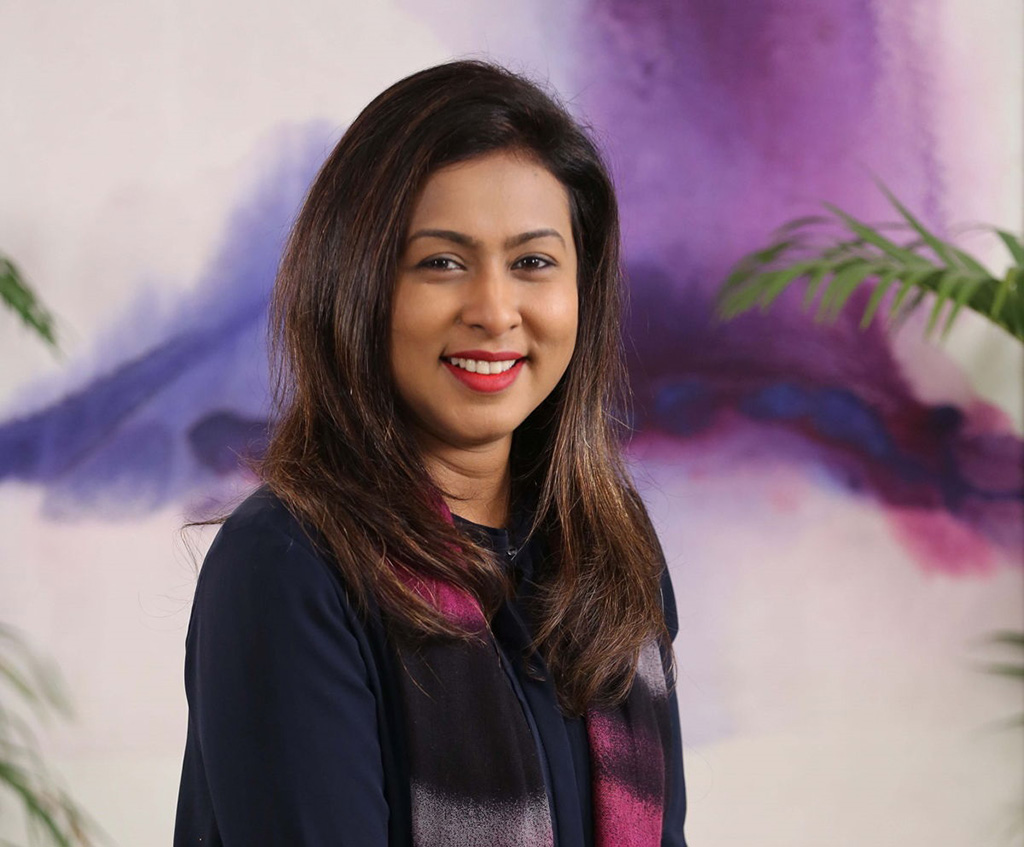
Future Startup
How do you think about life?
Tamara Hasan Abed
My life has been full of surprises. It has always handed me things that I was least expecting. As I said, I lost my mother at the age of 7- an event that completely changed my life. After my MBA, when I just started working at Goldman Sachs, 9/11 happened and my life changed again. At the age of 38, I became single. And then at 40, I found my husband and at 42, had my first child. I would say that life has given me enough surprises and changes. And my life has anything but followed a conventional path. But in almost all the instances, I ended up in a better place than before.
After 9/11, I left my lucrative job at Goldman Sachs and found my passion in life with Aarong. There is a silver lining in every dark cloud. We just can’t see it at that moment. Life is about endurance.
I have learned from life that there is little value in planning, rather we should try to live life in the moment. Mindful presence is far more rewarding an experience and an effective antidote to our ever-growing anxieties of modern life. I try not to plan too much but instead live life as it comes while trying to keep my center solid.
At this stage of my life, I know what is important to me. I try to see the bigger picture so that I don’t stress out about what I have done and what I should have done. I actively try not to take life too seriously.
One advice I would give to people starting out is to put in the effort to do things well rather than cut corners and aim to just get by. When people learn and do things for the sake of pleasing someone else, getting recognition, or just getting the job done instead of satisfying their own curiosity, understanding something properly or setting high professional standards for themselves, they remain ‘half-baked’ when they become more experienced and it shows when they rise higher. Ultimately, it catches up with them.
Future Startup
What books have you been reading lately?
Tamara Hasan Abed
The last book I read was Option B written by Sheryl Sandberg and Adam Grant. This was her second book. I read her first book Lean In and was equally fascinated by her insights and perspective. While reading Option B, I was going through a personal tragedy. One of my aunts, with whom I was very close, died. This book helped me to go through the difficult time as well as be there for others who were close to her.
Future Startup
What advice would you give to people who are just starting out?
Tamara Hasan Abed
One advice I would give to people starting out is to put in the effort to do things well rather than cut corners and aim to just get by. When people learn and do things for the sake of pleasing someone else, getting recognition, or just getting the job done instead of satisfying their own curiosity, understanding something properly or setting high professional standards for themselves, they remain ‘half-baked’ when they become more experienced and it shows when they rise higher. Ultimately, it catches up with them.
Also, if you have a strong moral compass, it will give you inner confidence and sound sleep, no matter what comes your way.
I have learned from life that there is little value in planning, rather we should try to live life in the moment. Mindful presence is far more rewarding an experience and an effective antidote to our ever-growing anxieties of modern life. I try not to plan too much but instead live life as it comes while trying to keep my center solid.
Interview by Ruhul Kader, transcription by Md. Tashnim and photo by Aarong
Implementation of 7th Five-year Plan and SDGs
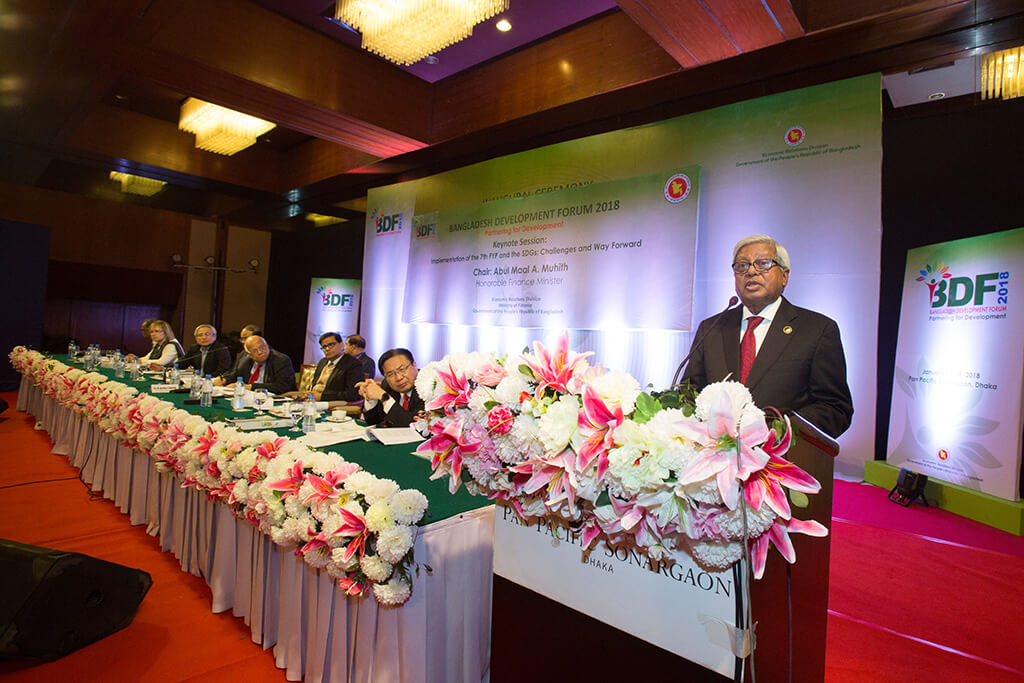
Sir Fazle stresses quality improvement of basic services and lasting partnerships
Bangladesh will have to shift its focus from providing basic services only to ensuring improved quality of those services and work to forge stronger partnerships between the government, non-governmental development actors and private sector to fulfil the targets of its 7th five-year plan and the sustainable development goals.
BRAC founder-chairperson Sir Fazle Hasan Abed made these observations while speaking at the Bangladesh Development Forum 2018. The two-day high profile event organised by the Economic Relations Division (ERD) under the finance ministry concluded today on Thursday in the capital.
Sir Fazle spoke at the opening plenary session titled ‘Implementation of the 7th FYP and the SDGs: Challenges and way forward’ on Wednesday (17 January 2018). The session was also addressed, among others, by BRAC’s executive director Dr Muhammad Musa, its senior director for strategy, communications and empowerment Asif Saleh, and director of Advocacy for Social Change department KAM Morshed.
Stressing three areas of priority in implementing the government’s 7th five-year plan and achieve the SDG targets, Sir Fazle pointed out that eradicating extreme poverty, improving the quality of basic services and enhancing the quality of education will be the vital factors in this regard.
‘We must prioritise the eradication of extreme poverty in Bangladesh. While one cannot deny the tremendous progress made, there are still 20 million people in our country who live in the direst forms of poverty and deprivation. The government has taken many initiatives, including the Ekti Bari Ekti Khamar project, to help people in extreme poverty. BRAC pioneered the ultra-poor graduation approach, which has lifted millions of people out of ultra-poverty in Bangladesh, and has been replicated in over 50 countries globally,’ he said, underscoring the need for all relevant actors to join hands to eradicate extreme poverty from Bangladesh.
Sir Fazle also called on relevant actors to work together to reduce maternal mortality. ‘A recent report indicates that some of the gains achieved during the MDG era have now stalled. The maternal mortality ratio (MMR) has remained the same at 196 per 100,000 live births between 2010 and 2016. We have to dig into the reasons why such an impressive trajectory of improvements has stopped,’ he said.
Collaboration of all relevant actors is a must for quality improvement of education at all levels, he noted, further commenting on the importance of teachers’ capacity building at the pre-primary level. ‘In order to cater to the needs of young children, the teachers need special orientation, training and support. They need to be more like facilitators, the classrooms need to look very different and the children need to learn through play.’
Sir Fazle also observed that the government in its endeavour to reform public sector institutions should involve the civil society as well. ‘The government alone cannot address the challenge of reforming its public institutions. It will require credible partners, and here too the civil society organisations can play an extremely constructive and positive role’ he said.
Representatives of Pakistan Poverty Alleviation Fund visit BRAC in Pakistan
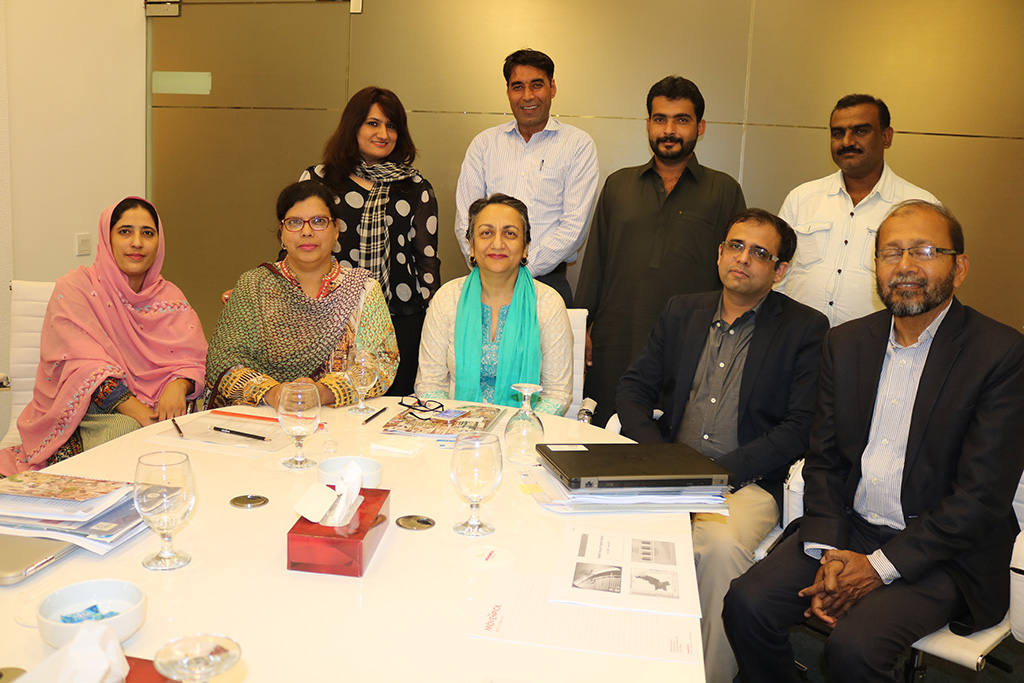
Simi Kamal, the senior group head for grants and operations, and Mohammed Ashraf, the programme management specialist for the Pakistan Poverty Alleviation Fund (PPAF) paid a two-day visit to PPAF funded BRAC’s programme for poverty reduction (PPR) office at Hub Chowki, Lasbela.
PPR is specially designed to meet the needs of people in vulnerable and marginalised communities, who are deprived of social and economic opportunities. An integrated model is used to provide a holistic environment conducive to the socio-economic uplift of people living in extreme poverty. The objective is poverty reduction through the creation of sustainable conditions of social and economic development, including increased income and production capacity and social support. As of December 2017, 221 community organisations have been established, 321 clients received asset transfers, and 564 community members received vocational and technical training. 28 community schools have been established and 37 government schools received rehabilitation support. Two health centres were established and 106 women-friendly latrines have been constructed. 39 clean drinking water schemes and 33 solar lighting schemes have been completed.
The visit was an extensive attempt to monitor gender parity and women’s participation in the programme. On the first day, Kamal and Ashraf were briefed about PPR operations and the progress of the programme by the programme manager, Changiz Baloch, communications coordinator, Zilay Huma, and programme lead, Kashif Ashraf.
The visitors were taken on a field visit the next day. The first stop was BRAC’s community school in Ibrahim Sasoli Goth in Union Council Sakran, Lasbela. Kamal discussed academic matters with the head teacher, and had a chit chat with the students. She met with members of the school management committee and the students’ parents. She checked all the facilities supplied by BRAC in Pakistan to the community school, such as washrooms, fans, lights and teaching material.
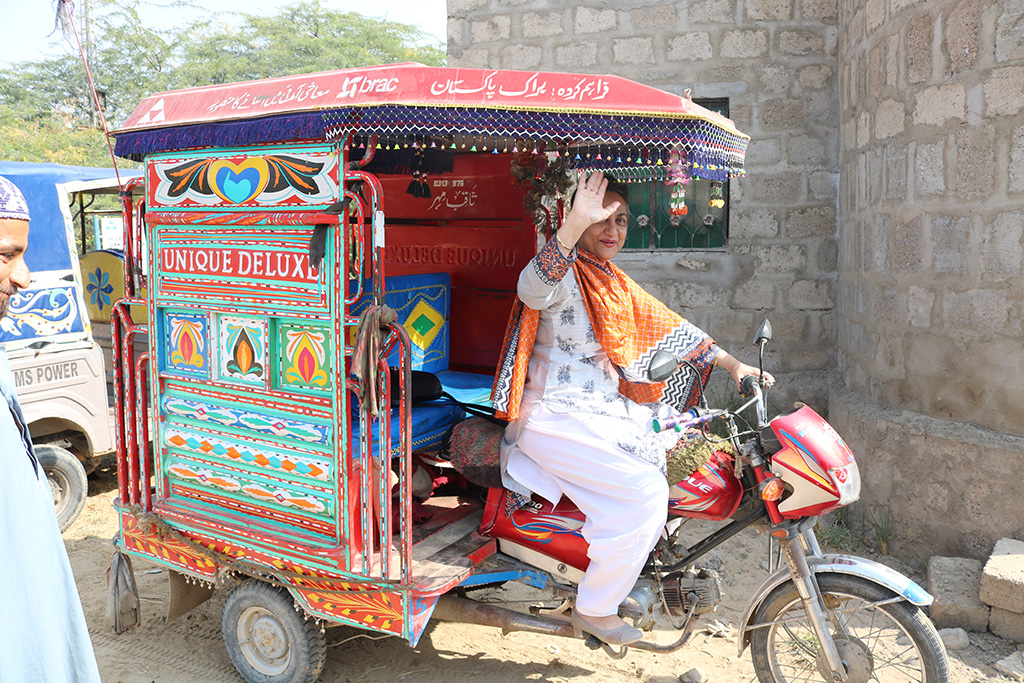
The next stop was a community health centre at Hashim Wahora Goth. The visitors met with the staff and discussed in length the operations and medical procedures.
Next was the Local Support Organization (LSO) Band Murad office at Mubarak Goth. The president of the LSO, Rehmat Ullah, and vice president, Saliha Bibi, welcomed the PPAF team. LSO members gave a detailed presentation about their community work and their linkages with government institutions. The PPAF team was introduced to all the committee and subcommittee members of the LSO. Kamal interacted with the procurement, education, health and audit committees of the LSO. She was very concerned about women’s representation and participation in the community development work and was delighted to see Saliha Bibi and other extraordinary women speaking for themselves and breaking the glass ceiling. She even drove around in an autorickshaw to encourage women to work outside their homes. She visited different community infrastructure schemes in Mubarak and Ibrahim Sasooli Goth and met clients.
The visit came to an end with a dinner and an informal meeting where Kamal shared her views about BRAC Pakistan’s community development work. She was surprised and contented to see vibrant and meaningful women’s participation in the community. She appreciated BRAC Pakistan staff at Lasbela for their outstanding performance in community mobilisation. She wished BRAC in Pakistan well in its future endeavours.
BRAC to render supports to 4.5 lakh ultra-poor by 2020
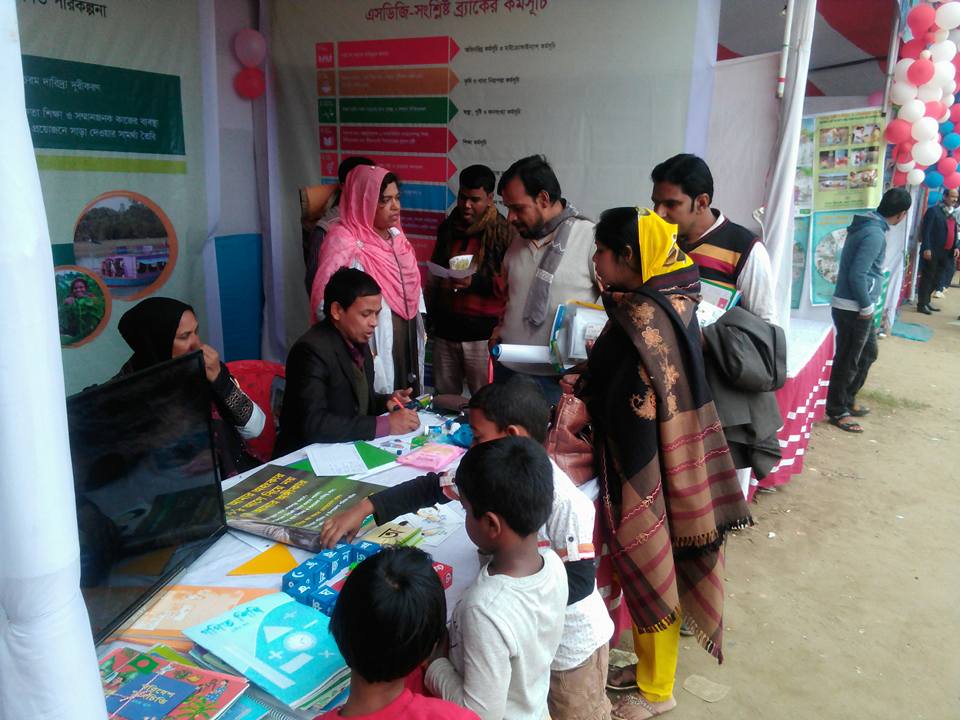
BRAC on Saturday said it has set a target to support 4.5 lakh ultra-poor families across the country by 2020 to complement government's effort to eradicate extreme poverty.
BRAC's endeavor in this regard was projected at the 'Development Fair 2018' that the world's largest non-government organization took part. The three-day fair rounded off today at the National Shilpakala Academy in the city.
BRAC showcased its range of programmes implemented for poverty alleviation and development at the fair. Among its programmes, Targeting the Ultra Poor (TUP) was specially focused in the event for its dedicated work since 2002 in stamping out extreme poor.
Brochures describing the TUP programme activities, leaflets explaining its role in the achievement of country's Millennium Development Goals (MDGs) and booklets profiling the families successfully graduating from ultra-poverty were among the materials displayed at the BRAC stall at the fair. Through its TUP programme BRAC provided assistance to over 17 lakh families in 47 districts from 2002 to 2017 to recover from ultra-poverty.
In 2018 TUP is being implemented in 210 upazilas of 43 districts, BRAC said on Saturday. Current allocation under the programme for each participating family is roughly Tk. 40,000.
Terms of Use
All photos and content on this website are the property of BRAC and may not be used without expressed permission from BRAC. If you have any questions about using content from our site, please e-mail This email address is being protected from spambots. You need JavaScript enabled to view it..
Terms & Conditions
The network of Web Sites (collectively, the "BRAC Web Sites") operated by The BRAC or its affiliates or subsidiaries, is comprised of various Web sites and Web pages. The BRAC Web Sites are offered to you conditioned on your acceptance without modification of the terms, conditions, and notices contained herein. Your use of the BRAC Web Sites constitutes your agreement to all such terms, conditions, and notices. Your use of a particular BRAC website included within the BRAC Web Sites network may also be subject to additional terms outlined elsewhere on that website. Additionally, the BRAC Web Sites may themselves contain additional terms that govern particular features or services. In the event that any of the terms, conditions, and notices contained herein conflict with the Additional Terms or other terms and guidelines contained within any particular BRAC website, then these terms shall control.
PLEASE READ THE FOLLOWING TERMS OF USE AND DISCLAIMERS CAREFULLY BEFORE USING THIS WEB SITE (this "Site"). By accessing or using this Site, you agree to these terms of use, conditions and all applicable laws. If you do not agree to these terms you may not use this Site.
TERM; TERMINATION
These terms and conditions are applicable to you upon your accessing the Site and/or completing the registration/Signup for BRAC FORUM, BRAC BLOG and BRAC NEWSLETTER. These terms and conditions, or any of them, may be modified or terminated by BRAC without notice at any time for any reason. The provisions relating to Copyrights and Trademarks, Disclaimer, and Limitation of Liability shall survive any termination.
COPYRIGHTS AND TRADEMARKS
THE ENTIRE CONTENT INCLUDED IN THIS SITE, INCLUDING BUT NOT LIMITED TO TEXT, DESIGN, GRAPHICS, INTERFACES, OR CODE AND THE SELECTION AND ARRANGEMENTS THEREOF IS COPYRIGHTED AS A COLLECTIVE WORK OF BRAC, AND IS THE PROPERTY OF BRAC. ALL TRADEMARKS, SERVICE MARKS, AND TRADE NAMES (COLLECTIVELY THE "MARKS") ARE TRADEMARKS OR REGISTERED TRADEMARKS OF AND ARE PROPRIETARY TO BRAC, OR OTHER RESPECTIVE OWNERS THAT HAVE GRANTED BRAC THE RIGHT AND LICENSE TO USE SUCH MARKS. IMAGE COPYRIGHTS ARE LISTED UNDER THE CORRESPONDING IMAGE AND/OR AS WATER MARK ON THE IMAGE.
USE OF SITE (PERSONAL AND NON-COMMERCIAL USE LIMITATION)
Unless otherwise specified, the BRAC Web Sites are for your personal and noncommercial use. You may distribute, display or publish any information, images or services obtained from the BRAC Web Sites for personal, noncommercial and/or promotional uses only. But, you may not reproduce, license or sell any information, images, products or services obtained from the BRAC Web Sites.
If you publish and/or display any images from BRAC websites, you must specify the source or copyright holder information below or inside the image as mentioned under the image and/or as water mark on the image. You are obliged to keep the copyright information on the image and/or mention the exact phrase of the copyright text included under the image.
You may electronically copy, download and print hard copy portions of the material from the different areas of the Site solely for your own AND noncommercial use. Any other use of materials on this Site, including but not limited to the modification, reproduction, distribution, republication, or transmission of the content of this Site, without prior written permission of BRAC is strictly prohibited.
TYPOGRAPHICAL ERRORS
In the event a BRAC web site has listed an incorrect data due to typographical error, BRAC shall have the right to correct it anytime. BRAC will not be responsible or shall have the right to refuse or cancel any inconvenience occurred because of the incorrect information.
USER PARTICIPATION
BRAC does not and cannot review all communications and materials posted to or created by users accessing the Site and is not in any manner responsible for the content of these communications and materials. You acknowledge that by providing you with the ability to view and distribute user generated content on the Site, BRAC is merely acting as a passive conduit for such distribution and is not undertaking any obligation or liability relating to any contents or activities on the Site. However, BRAC reserves the right to block or remove communications or materials that it determines to be (a) abusive, defamatory, or obscene, (b) fraudulent, deceptive, or misleading, (c) in violation of a copyright, trademark or; other intellectual property right of another or (d) violates any law or regulation or (e) offensive or otherwise unacceptable to BRAC at its sole discretion. Note that any personally identifiable information you may post or transmit will be treated by BRAC in accordance with BRAC's Privacy Policy.
DONATION REFUND POLICY
We are grateful for your donation and support of our organisation. Donations are normally non-refundable but if you have made an error in making your donation or change your mind about contributing to our organisation please contact us. Refunds are returned using the original method of payment. If you made your donation by credit/debit card/mobile money, your refund will be credited to that same credit/debit card/mobile account within 7 working days.
THIRD-PARTY LINKS
In an attempt to provide increased value to our visitors, this Site may contain links to other sites on the Internet that are owned and operated by third party vendors and other third parties (the "External Sites"). However, even if the third party is affiliated with BRAC, BRAC has no control over these linked sites, all of which have separate privacy and data collection practices, independent of BRAC. BRAC has no responsibility or liability for these independent policies or actions and is not responsible for the privacy practices or the content of such web sites. These linked sites are only for your convenience and therefore you access them at your own risk. Links do not imply that BRAC sponsors, endorses, is affiliated with or associated with, or has been legally authorised to use any trademark, trade name, service mark, design, logo, symbol or other copyrighted materials displayed on or accessible through such External Sites. Nonetheless, BRAC seeks to protect the integrity of its Site and the links placed upon it and therefore requests any feedback on not only its own Site, but for sites it links to as well (including if a specific link does not work).You should contact the Site administrator or Webmaster for those External Sites if you have any concerns regarding such links or the content located on such External Sites.
DISCLAIMER
THIS SITE AND THE MATERIALS, INFORMATION, SERVICES, AND PRODUCTS IN THIS SITE, INCLUDING, WITHOUT LIMITATION, TEXT, GRAPHICS, AND LINKS, ARE PROVIDED "AS IS" AND WITHOUT WARRANTIES OF ANY KIND, WHETHER EXPRESS OR IMPLIED. TO THE FULLEST EXTENT PERMISSIBLE PURSUANT TO APPLICABLE LAW, BRAC DISCLAIMS ALL WARRANTIES, EXPRESS OR IMPLIED, INCLUDING, BUT NOT LIMITED TO, IMPLIED WARRANTIES OF MERCHANTABILITY AND FITNESS FOR A PARTICULAR PURPOSE, NON-INFRINGEMENT, FREEDOM FROM COMPUTER VIRUS, AND WARRANTIES ARISING FROM COURSE OF DEALING OR COURSE OF PERFORMANCE. BRAC DOES NOT REPRESENT OR WARRANT THAT THE FUNCTIONS CONTAINED IN THE SITE WILL BE UNINTERRUPTED OR ERROR-FREE, THAT DEFECTS WILL BE CORRECTED, OR THAT THIS SITE OR THE SERVER THAT MAKES THE SITE AVAILABLE ARE FREE OF VIRUSES OR OTHER HARMFUL COMPONENTS. BRAC DOES NOT MAKE ANY WARRANTIES OR REPRESENTATIONS REGARDING THE USE OF THE MATERIALS IN THIS SITE IN TERMS OF THEIR COMPLETENESS, CORRECTNESS, ACCURACY, ADEQUACY, USEFULNESS, TIMELINESS, RELIABILITY OR OTHERWISE. THE ABOVE LIMITATIONS MAY NOT APPLY TO YOU.
LIMITATION OF LIABILITY
IN NO EVENT SHALL BRAC BE LIABLE FOR ANY DIRECT, INDIRECT, SPECIAL, PUNITIVE, INCIDENTAL, EXEMPLARY OR CONSEQUENTIAL, DAMAGES, OR ANY DAMAGES WHATSOEVER, EVEN IF BRAC HAS BEEN PREVIOUSLY ADVISED OF THE POSSIBILITY OF SUCH DAMAGES, WHETHER IN AN ACTION UNDER CONTRACT, NEGLIGENCE, OR ANY OTHER THEORY, ARISING OUT OF OR IN CONNECTION WITH THE USE, INABILITY TO USE, OR PERFORMANCE OF THE INFORMATION, SERVICES, AND MATERIALS AVAILABLE FROM THIS SITE. THESE LIMITATIONS SHALL APPLY NOT WITHSTANDING ANY FAILURE OF ESSENTIAL PURPOSE OF ANY LIMITED REMEDY. BECAUSE SOME JURISDICTIONS DO NOT ALLOW LIMITATIONS ON HOW LONG AN IMPLIED WARRANTY LASTS, OR THE EXCLUSION OR LIMITATION OF LIABILITY FOR CONSEQUENTIAL OR INCIDENTAL DAMAGES, THE ABOVE LIMITATIONS MAY NOT APPLY TO YOU.
Join the world’s biggest family

